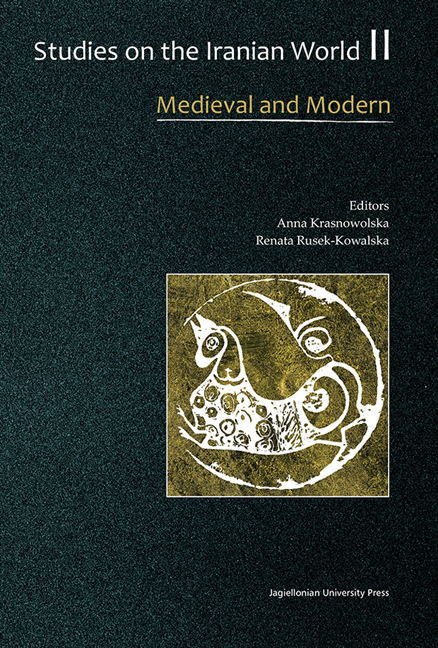Book contents
- Frontmatter
- Contents
- Foreword
- Linguistics
- Literature
- Religion
- History
- The Failure of the Constitutional Monarchy in Iran: The Socio- and Psycho-Genesis of Reza Khan's Rise to Power
- Concerning One Unpublished Persian Historical Document from Afshar Period
- Clash or Compromise? Mongol and Muslim Law in the Ilkhanate (1258–1335)
- New Insights on the Fiscal System of the Early Ilkhanids through the Analysis of al-Murshid fī al-Ḥisāb, an Unknown Accounting Manual
- Archaeological Survey of Kamar-e Marj Castle in Kermān Province
- Historians of their Time: Mongols, Mamluks and the Treatment of the Past
- Arts
- Social and Cultural Studies
Concerning One Unpublished Persian Historical Document from Afshar Period
from History
Published online by Cambridge University Press: 12 January 2018
- Frontmatter
- Contents
- Foreword
- Linguistics
- Literature
- Religion
- History
- The Failure of the Constitutional Monarchy in Iran: The Socio- and Psycho-Genesis of Reza Khan's Rise to Power
- Concerning One Unpublished Persian Historical Document from Afshar Period
- Clash or Compromise? Mongol and Muslim Law in the Ilkhanate (1258–1335)
- New Insights on the Fiscal System of the Early Ilkhanids through the Analysis of al-Murshid fī al-Ḥisāb, an Unknown Accounting Manual
- Archaeological Survey of Kamar-e Marj Castle in Kermān Province
- Historians of their Time: Mongols, Mamluks and the Treatment of the Past
- Arts
- Social and Cultural Studies
Summary
SUMMARY
Among rich collections preserved at Georgian Depositories, Persian and Georgian-Persian historical documents present the most important records for the study of Iranian- Georgian political as well as social-economic interrelations. They belong to 16th–19th centuries and comprise over 1700 manuscripts.
In Georgian collections are found nearly 30 Persian documents from the Afshar period (1736–1796). Some of them remain unpublished up to the present. These documents reflect Nadir Shah's (Pers. Nāder Shāh) policy toward Georgia, inner social situation of East Georgia during the Qizilbashs.
The article deals with an unpublished document issued in 1737 by the commander of East Georgia, Sefi-Khan (Pers. Safi-Khān), kept at the National Center of Manuscripts of Georgia (Pd-53). The deed is an order according to which Sefi-Khan points out the mdivanbeg (Pers. Turkish divānbeyg) of the region, Kaikhosro Baratashvili to reconfirm villages to one of aristocracy representative's descendant.
The document presents valuable material for the study of historical and social interrelations of Late Medieval Georgia with Persia during the Afshars. It is also important as a typical example of style and structure of the Persian juridical act.
The cultural past of Georgia, while being a unified state, as well as divided into independent principalities clearly reflects tendencies and peculiarities of different historical periods significantly induced by political and cultural orientation of the country. Islamic Orient, and principally Medieval Iran, has become the most decisive phenomenon in Georgia's history since the 16th century. Political, social-economic and cultural interrelations of these countries were recorded in Persian, Georgian and bilingual – Georgian-Persian historicaldocuments, which present mostly important primary sources for the study of Iranian-Georgian (and in the main, Caucasian) issues as well as of the whole history of Near East.
These significant documents are preserved in rich collections of the Georgian National Antiquities and are dated by 16th–19th centuries, belonging to Safavid, Afshar, Zand and Qajar periods, comprising more over 1700 deeds.
They are kept at the depositories in Tbilisi – the National Center of Manuscripts (the fund Pd, 511 units), the National Archive of the Ministry of Justice (the funds N 1452 and N 1450, (1237 units) and the Museum of Art of Georgia (4 units). They are absolutely unique as regards their content, completeness, historical and artistic significance.
- Type
- Chapter
- Information
- Studies on the Iranian WorldMedieval and Modern, pp. 175 - 186Publisher: Jagiellonian University PressPrint publication year: 2015



